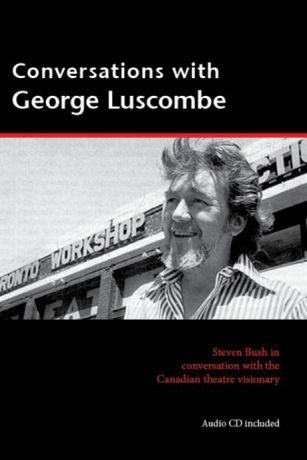Arts
You are here
Remembering a pioneer of alternative theatre

August 19, 2013
“I don’t train actors, I train citizens.” Such was George Luscombe’s reply to a query about his profession reported in Steven Bush’s new book, Conversations with George Luscombe.
Luscombe was the pioneer of alternative theatre in Toronto and a seminal figure in the development of contemporary Canadian theatre. Bush’s book with accompanying CD, of recorded conversations with Luscombe before his death, is an important and unique contribution to Canadian theatre history.
Luscombe, who died in 1999, left a legacy that, because of its political and often controversial nature, has been both praised and maligned. His lack of deference to the art “establishment” of government granting bodies and corporate boards likely led to the consequence that his contributions remains poorly documented in the annals of theatre history. Bush’s book is a welcome corrective to that situation.
Life and art
Luscombe was born into a working class family in Toronto during the Depression. He made his way to Britain and became an actor in Joan Littlewood’s Workshop Theatre, a physical theatre-based, left-wing company. Inspired by her training and her politics, Luscombe returned to Toronto and with Tony Ferry founded the theatre company, Toronto Workshop Productions (TWP) in 1959, eventually housed on Alexander Street—the current home of Buddies in Bad Times theatre.
He eschewed the naturalism of much contemporary western theatre in favour of a physically based, Brechtian style. He employed a rigorous training approach he called “The Efforts” which his ensemble of actors practiced daily. He was way ahead of his time in working with the actors to develop plays through kinetic exploration and interaction instead of working exclusively from scripts.
Author Steven Bush, who arrived from Ohio as a Vietnam war resister in 1969, describes walking into TWP and being transformed by Luscombe’s approach and passion. A large part of the book is interviews with Luscombe describing the philosophy and technique of his training and ensemble creation.
Political theatre
Luscombe was also a self-proclaimed Marxist, although he followed no particular tradition. His main theatrical interest was the development and production of plays whose subject was the working class. TWP’s political themes resonated with the radicalization of the 1960s and 70s. The plays tackled topics that no other theatre in Canada would touch: 1973 coup in Chile, the Mac-Paps (a battalion of Canadians who fought in the Spanish Civil War), Quebec politics and racism. The TWP production Summer ’76 was a critique of the Olympics mounted in the same year as the Montreal Olympics.
Actor R.H. Thomson, who worked with Luscombe, wrote in the book’s preface: “The politics of the powerless interested George. The feel of the street, the world of the factory, ordinary Canadians fighting fascism in Spain…the unemployed men and women in the soup kitchens of Canada of the dirty thirties, all of these were George’s passion.”
Themes of class, power, capitalism and resistance vibrated with political sensibilities of the day but managed to sidestep boorish polemics. In a tribute, Theatre Director Ken Gass said “Luscombe proved that strong socialist themes were not incompatible with a highly theatrical style.”
Sadly, many of the plays have been lost and the history sanitized or trivialized as the alternative theatre of the 1960s and 70s radicalization became the more mainstream theatre of today. TWP did not survive this transition and closed in 1989 against Luscombe’s wishes. Other alternative theatres inspired by the TWP and Luscombe have continued including Theatre Passe Muraille, Tarragon Theatre and Factory Theatre. Theatre director and critic Urjo Kareda (now deceased) summed up the current situation in a tribute in Bush’s book, “We no longer have so definitely a political theatre, and that is our loss.”
Section:
Topics:









